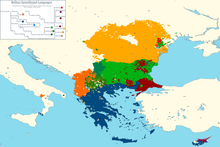Wp/isv/Језычны свез
Језычны свез (něm.: Sprachbund - језычна федерација) јест група језыков, кторы имајут обчи мєстне чрты, в изслєдку географичној близкости и језычного контакта. Језыки в свезу могут быти не свезане обчим прєдком, или быти оддаљено свезаными, але својства свеза стварјајут заблудны дојем родства.

Приклады
edit- Балканскы језычны свез
- Алтајске језыкы[1][2][3]
- Континентална Југоизточна Азијатска језычна мєстност
- и тако даље
Източникы
edit- ↑ Starostin, George (5 aprilja 2016), "Altaic Languages", Oxford Research Encyclopedia of Linguistics (na anglijskom), doi:10.1093/acrefore/9780199384655.013.35, ISBN 978-0-19-938465-5, data dostupa: 11 julija 2023
- ↑ R. M. W. Dixon (1997): The Rise and Fall of Languages. Cambridge University Press. Page 32: "Careful examination indicates that the established families, Turkic, Mongolian and Tungusic, form a linguistic area (called Altaic)...Sufficient criteria have not been given that would justify talking of a genetic relationship here."
- ↑ De la Fuente, José Andrés Alonso (2016). "Review of Robbeets, Martine (2015): Diachrony of verb morphology. Japanese and the Transeurasian languages". Diachronica. 33 (4): 530–537. doi:10.1075/dia.33.4.04alo.
For now, shared material between Transeurasian [i.e. Altaic] languages is undoubtedly better explained as the result of language contact. But if researchers provide cogent evidence of genealogical relatedness, that will be the time to re-evaluate old positions. That time, however, has not yet come.